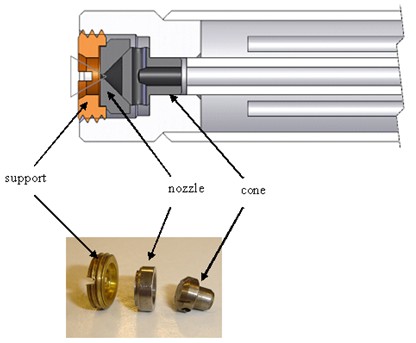Non catalytic steam gasification of wood bio-oil
The aim of this project was to investigate the feasability of steam gasification of a bio-oil produced by wood pyrolysis. The considered process is a spraying of the whoole bio-oil in a high temperature entrained flow. We have shown that this operation is possible ; a thermochemical model was developed and validated, and can support the design of a large scale unit.Actions
PhD work of Younes CHHITI
With ENERBIO financial support - In collaboration with CIRAD Montpellier, France
Institut National Polytechnique de Toulouse, September the 5th 2011
Abstract: Energy production from ligno-cellulosic biomass via gasification technology appears as an attractive option in the current energy context. The combination of decentralized fast pyrolysis of biomass to produce bio-oil, followed by transportation and gasification of bio-oil in bio-refinery has appeared as one of the most economically viable methods for syngas (H2+CO) production. The objective of this work is to bridge the lack of knowledge concerning the physicochemical transformation of bio-oil into syngas using non catalytic steam gasification in entrained flow reactors. This complex process involves vaporization, thermal cracking reactions with formation of gas, tars and two solid residues - char and soot - that are considered as undesirable products. This is followed by steam reforming of gas and tars, together with char and soot conversion. To better understand the process, the first step of gasification (pyrolysis) and thereafter the whole process (pyrolysis + gasification) were studied. The pyrolysis study focused on the influence of the heating rate, the final pyrolysis temperature nd the ash content of bio-oil on char, tars and gas yields. At the higher heating rate char yield is smaller than 1%. In addition, ash seems to promote polymerization reactions and causes a decrease of gas yield. Concerning gasification, the effect of temperature on syngas yield and composition was studied. An increase in the reaction temperature implies higher hydrogen yield and higher solid carbon conversion. A thermodynamic equilibrium calculation showed that equilibrium was reached at 1400°C. Finally, the soot formation and oxidation mechanisms were investigated through experiments in three different atmospheres: inert (pyrolysis), rich in steam (gasification) and in the presence of oxygen (partial oxidation). A semi-empirical model was proposed and validated. It is based on detailed chemistry to describe gas phase reactions, a single reaction using C2H2 concentration to describe soot formation and one main heterogeneous reaction to describe soot oxidation.

Detail of the spraying probe developped to inject the whoole bio-oil in the laboratory Entrained Flow Reactor.
Compressed air is added to the flow of bio-oil to ensure fine atomisation.
Publications
Wood bio-oil non catalytic gasification: influence of temperature, dilution by an alcohol and ash content
CHHITI, Younes; SALVADOR, Sylvain; COMMANDRE, Jean-Michel; Broust, F.; COUHERT, Carole
Energy and Fuels, September 2010, accepted December 2010
Thermal decomposition of bio-oil: focus on the products yields under different pyrolysis conditions
Younes Chhiti, Sylvain Salvador, Jean-Michel Commandré, François Broust
Fuel 102 (2012) 274-281
Soot formation and oxidation during bio-oil gasification: experiments and modeling
Y. Chhiti, S. Salvdor, M. Peyrot
Journal of Energy Chemistry, Vol. 22, N°5 (2013)
Book title: Gasification (ISBN 980-953-307-245-1), Chapter: Gasification of wood bio-oil
Younes Chhiti, Sylvain Salvador, Frederic Marias
ISBN 978-953-51-0818-4, edited by Yongseung Yun
Congress
Non catalytic gasification of wood bio-oil
Y. Chhiti, S. Salvador
3rd International Conference on Engineering for Waste Valorisation May 17-19, 2010, Beijing, China
PYROLYSIS OF WOOD BIO-OIL: INFLUENCE OF HEATING RATE AND FINAL TEMPERATURE ON PRODUCTS YIELD
Sylvain Salvador, Younes Chhiti, François Broust
19th International Symposium on Analytical and Applied Pyrolysis, Linz, Austria, 21-25 May 2012. Oral presentation.
Catalytic effect of ash on bio-oil thermal conversion
Younes Chhiti, Imane Boumnchar, Fatima Ezzahrae Alaoui M'hamdi, Rabie El Otmani, Khalid Kandoussi, Hicham Amrani Souhli,
Abdelaziz Sahibeddine and Sylvain Salvador
6th International Conference on Environmental Science and Development, February 14-15, 2015, Amsterdam. Article de 6 pages.